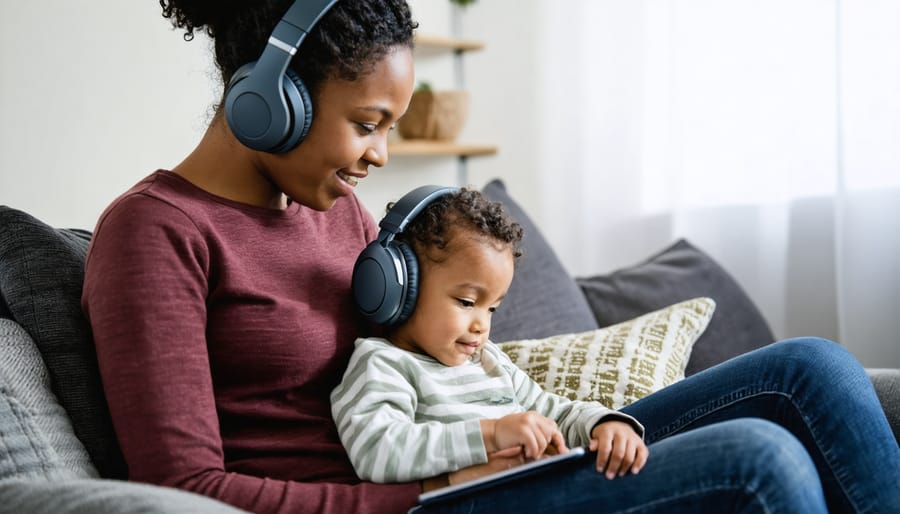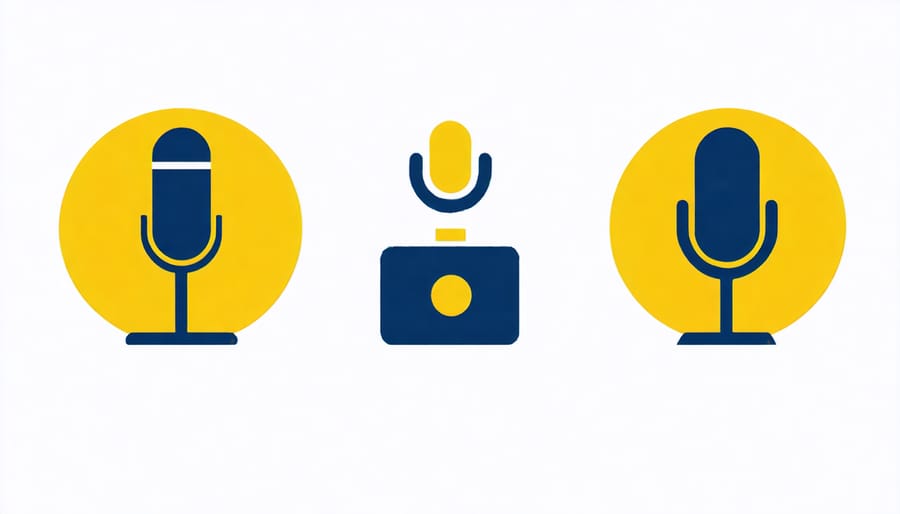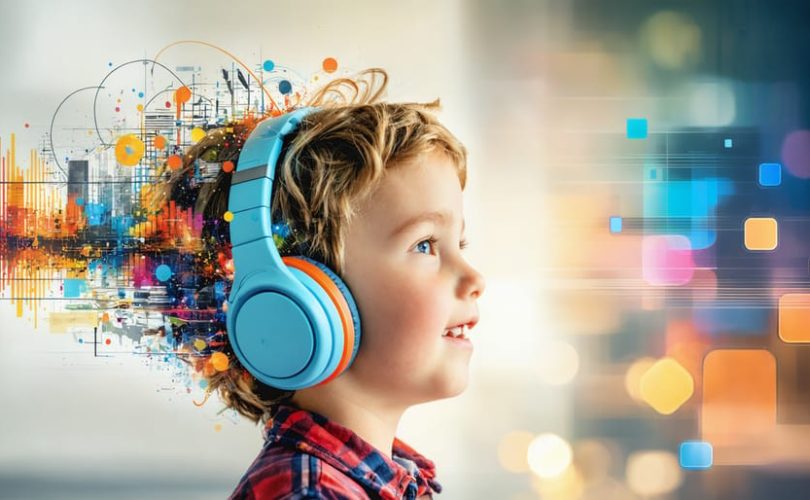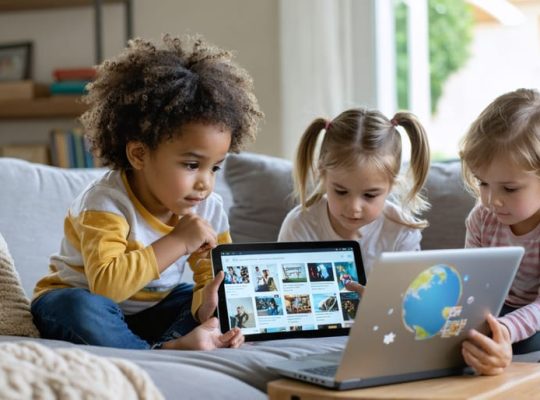In today’s digital landscape, podcasts have emerged as powerful tools that shapes your child’s worldview and cognitive development. Recent studies reveal that 67% of children who regularly engage with educational podcasts demonstrate improved critical thinking skills and enhanced vocabulary retention. These audio storytelling platforms offer a unique combination of entertainment and education, creating an immersive learning experience that resonates with young minds in ways traditional media cannot.
Unlike passive screen time, podcasts activate children’s imagination and encourage active listening – skills increasingly vital in our fast-paced world. From science adventures to historical narratives, youth podcasts transform everyday moments – car rides, quiet time, or bedtime routines – into opportunities for learning and growth. Their format naturally aligns with how children process information, allowing them to visualize concepts and develop stronger comprehension skills while staying engaged through compelling narratives.
As educators and parents seek alternatives to screen-based entertainment, podcasts emerge as a powerful middle ground, offering rich educational content without the drawbacks of visual media exposure. This growing medium represents a significant shift in how we approach children’s educational entertainment, providing a screen-free way to nurture curiosity and critical thinking.
The Rising Wave of Youth Podcasts
Popular Youth Podcast Categories
Young listeners are drawn to a diverse range of podcast categories that spark their curiosity and fuel their imagination. Educational storytelling podcasts blend learning with entertainment, featuring tales that teach history, science, and social skills in an engaging way. Science and discovery shows break down complex concepts into bite-sized, understandable segments that children can easily grasp and remember.
News and current events podcasts designed specifically for youth help them understand world happenings in age-appropriate ways, encouraging critical thinking and global awareness. Music-focused shows introduce children to different genres and cultures while teaching music appreciation and basic musical concepts.
Many young listeners enjoy interview-style podcasts where kids talk to other kids about their experiences, hobbies, and achievements. These peer-to-peer conversations create relatable content that resonates deeply with youth audiences. Book review and literacy podcasts encourage reading enthusiasm by discussing popular children’s literature and featuring author interviews.
Mental health and wellbeing podcasts address important topics like emotions, friendship, and self-esteem in ways that young listeners can understand and apply to their daily lives. These shows often include guided mindfulness exercises and coping strategies suitable for children.
Age-Appropriate Content Selection
When selecting podcasts for young listeners, age-appropriate content is crucial for both engagement and safety. Parents should start by checking the podcast’s recommended age rating and reading reviews from trusted sources. Look for content that aligns with your child’s interests while maintaining educational value.
For preschoolers and early elementary students, choose podcasts with simple storylines, clear language, and shorter episodes (typically 10-15 minutes). These might include gentle storytelling podcasts or basic science explanations with familiar concepts.
Elementary and middle school children can handle longer episodes (15-30 minutes) with more complex themes. Focus on podcasts that encourage critical thinking while avoiding inappropriate content or mature themes. Consider educational podcasts that complement school subjects or explore age-appropriate current events.
For teenagers, look for content that respects their growing maturity while still maintaining appropriate boundaries. These podcasts can address more sophisticated topics but should avoid explicit content, extreme political views, or potentially harmful messages.
Always preview episodes before sharing them with your children, and consider listening together to facilitate meaningful discussions about the content.

Building Critical Thinking Skills Through Podcasts
Active Listening Benefits
When children actively engage with podcasts, they develop crucial listening skills that extend far beyond entertainment. Unlike passive screen time, which can have a negative impact on mental health, focused podcast listening encourages deep concentration and analytical thinking.
Dr. Sarah Chen, a child development specialist, explains, “When children listen to podcasts, they’re creating mental images, processing complex information, and developing their ability to follow narrative threads. This active engagement strengthens their comprehension skills naturally.”
Through regular podcast listening, children improve their:
– Attention span and focus
– Verbal comprehension
– Critical thinking abilities
– Memory retention
– Vocabulary development
– Abstract thinking skills
Parents often notice that their children become better listeners not just during podcast time, but in everyday situations too. Nine-year-old Emma’s mother shares, “Since we started our weekly podcast routine, I’ve noticed Emma asking more thoughtful questions during family discussions and paying closer attention during school lessons.”
The beauty of podcast listening lies in its flexibility. Children can pause, rewind, and discuss content with parents or peers, creating meaningful learning moments. This interactive approach helps them process information at their own pace while building confidence in their listening abilities.
To maximize these benefits, encourage your child to:
– Listen in a quiet space without distractions
– Take notes or draw pictures about what they hear
– Discuss the content afterward
– Choose topics that genuinely interest them
– Practice regular listening sessions
Question Formation and Curiosity
Podcasts have a unique way of sparking curiosity in young minds, encouraging them to ask deeper questions about the world around them. When children listen to engaging podcast content, they naturally develop inquiry skills as they process new information and concepts.
Many parents report that their children start asking more sophisticated questions after regularly listening to educational podcasts. For instance, a science-focused podcast might prompt a child to wonder about gravity’s effects on different planets, leading to rich family discussions and further exploration of astronomy.
The question-and-answer format common in many youth podcasts helps children learn how to structure their own questions effectively. They begin to understand the difference between surface-level questions and those that lead to meaningful discoveries. This skill transfers to their academic life, where they become more confident in classroom discussions and research projects.
Podcast hosts often model critical thinking by asking thoughtful questions during interviews or while exploring topics. Children naturally mimic this behavior, learning to approach new information with healthy skepticism and curiosity. Dr. Sarah Chen, a child development specialist, notes that “when children hear well-crafted questions in podcasts, they internalize these patterns of inquiry and begin using them in their daily lives.”
To maximize this benefit, parents can engage with their children after podcast episodes by asking open-ended questions like “What surprised you about this story?” or “What else would you like to know about this topic?” This practice reinforces active listening and helps children develop their own questioning strategies, setting the foundation for lifelong learning and intellectual curiosity.
Parent’s Role in Podcast-Based Learning

Discussion Strategies
Engaging children in conversations about podcast content can deepen their understanding and create meaningful learning experiences. Start by listening together when possible, as this shared experience builds connection and allows you to gauge their reactions in real-time. After each episode, begin with open-ended questions like “What surprised you most?” or “Which character did you relate to?”
Create a comfortable environment where children feel safe expressing their thoughts without judgment. Use the “pause and discuss” technique during episodes when complex topics arise, allowing children to process information at their own pace. This approach helps them develop critical thinking skills while ensuring they fully grasp important concepts.
Encourage children to make personal connections by asking questions like “Has something similar ever happened to you?” or “How would you handle that situation?” These prompts help them relate podcast content to their own experiences, making the learning more meaningful and memorable.
Consider starting a family podcast journal where children can draw or write their thoughts about episodes. This creative outlet helps them process information and serves as a springboard for future discussions. For younger listeners, use role-play to act out scenarios from the podcast, making abstract concepts more concrete and engaging.
Remember to validate their opinions and observations, even when they differ from yours. This builds confidence in their ability to analyze and interpret media content independently.
Creating Learning Opportunities
Podcast learning doesn’t have to end when the episode stops playing. There are numerous ways to extend these audio experiences into meaningful daily activities that reinforce learning and engagement. One effective approach is to encourage children to keep a podcast journal where they can write down interesting facts, questions, or ideas that come up during listening sessions.
Turn car rides into discussion time by asking your child to recap their favorite parts of recent episodes. This not only helps with memory retention but also develops their storytelling abilities. Create hands-on projects inspired by podcast topics – if they’ve listened to a science episode about space, help them build a model solar system or draw pictures of constellations they’ve learned about.
Consider starting a family podcast club where everyone listens to the same episode and shares their thoughts during dinner time. This creates wonderful opportunities for cross-generational conversations and deeper understanding. You might even encourage children to create their own mini-podcasts about topics they’re passionate about, using simple recording tools on a smartphone.
For educators, podcast content can be integrated into lesson plans through creative writing assignments, group discussions, or art projects. Students might create visual representations of stories they’ve heard or write alternative endings to podcast narratives. These activities help transform passive listening into active learning experiences that stick with young minds.
Remember to celebrate and display podcast-inspired creations, whether it’s artwork, writing, or recordings. This validation encourages continued engagement and shows children that their learning journey matters.
Balancing Screen-Free Learning

Benefits of Audio Learning
Audio learning offers unique advantages that make it an excellent alternative to traditional screen time effects. When children listen to podcasts, they engage their imagination in ways that visual media doesn’t allow. Instead of having images presented to them, they create mental pictures of what they’re hearing, which strengthens their creative thinking and visualization skills.
Unlike video content, podcasts encourage active listening, helping children develop better concentration and attention spans. They can listen while moving around, during quiet time, or even while working on art projects, making learning more flexible and natural. This multitasking ability doesn’t compromise the learning experience as it often does with screen-based activities.
Many parents report that their children seem more relaxed and focused when engaging with audio content. The absence of bright screens and rapid visual changes creates a gentler, more contemplative learning environment. This can be particularly beneficial for children who are sensitive to visual stimulation or those who struggle with traditional learning methods.
Audio learning also helps develop crucial language skills. Children exposed to well-produced podcasts often show improvements in vocabulary, pronunciation, and verbal expression. They learn to follow complex narratives and understand different speaking styles, which enhances their overall communication abilities.
Healthy Media Diet
Just like maintaining a balanced diet for physical health, it’s essential to cultivate healthy media consumption habits for your child’s mental well-being. Podcasts can be a valuable part of this media mix, offering a refreshing alternative to screen-based entertainment.
Consider implementing the “3-2-1” approach: for every three hours of screen time, include two hours of audio content like podcasts, and one hour of non-digital activities. This balance helps reduce eye strain while keeping children engaged with diverse forms of media.
Dr. Sarah Martinez, a child development specialist, suggests: “Podcasts can serve as a bridge between passive and active entertainment. They engage imagination while allowing children to move, play, or create art while listening.”
To maintain this healthy balance:
– Set designated listening times, perhaps during car rides or quiet activities
– Mix educational podcasts with entertainment-focused content
– Encourage family listening sessions to promote discussion
– Use podcasts as alternatives to screen time before bedtime
– Complement podcast listening with related hands-on activities
Remember that every child is different, so observe how your child responds to various types of media and adjust accordingly. The goal isn’t to eliminate other forms of media but to create a well-rounded diet that supports learning, entertainment, and development.
As we’ve explored throughout this article, youth podcasts offer a wealth of benefits for young minds. From enhancing listening skills and critical thinking to fostering creativity and emotional intelligence, these digital audio experiences can be powerful educational tools when thoughtfully integrated into children’s media diets.
Parents and educators who take an active role in selecting age-appropriate podcast content can help create meaningful learning experiences that complement traditional education. By listening together, asking questions, and encouraging discussion, adults can transform passive listening into active engagement that strengthens family bonds and supports cognitive development.
Remember that every child is unique, and what works for one may not work for another. Start with short episodes, follow your child’s interests, and gradually introduce new topics and formats. Pay attention to how your child responds and adjust accordingly. The goal isn’t to replace other activities but to add another valuable dimension to their learning journey.
As podcasts continue to evolve and grow, they represent an exciting opportunity to nurture curious, engaged, and thoughtful young listeners. Whether used during car rides, quiet time, or as part of structured learning activities, podcasts can help children develop essential skills for success in our increasingly digital world.
By embracing this medium mindfully and intentionally, we can help young people harness the full potential of podcasts while fostering a lifelong love of learning and storytelling.




